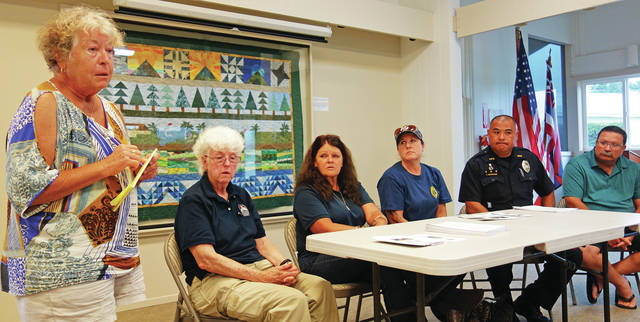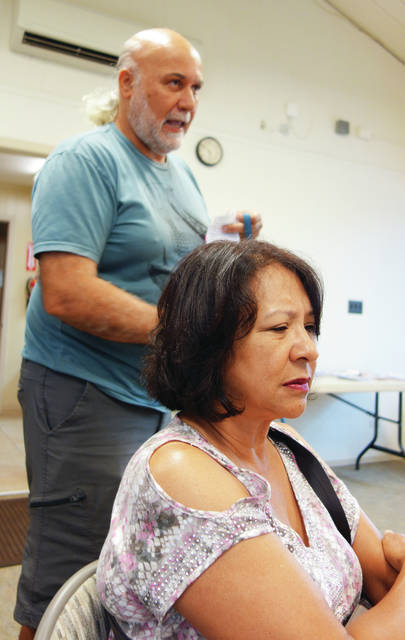Who let the dogs out? Community members wrestle with loose dog concerns, attacks
WAIKOLOA VILLAGE – Tensions mounted Friday night, as eight residents shared emotional encounters they’d had with loose dogs in Waikoloa Village the past eight months or so. Many led to human and pet attacks.
Beverley Brand, a director on the Waikoloa Village Association (WVA) board, called the public meeting in the HOA Community Room in response to increased complaints she’d heard recently. Nearly 30 neighbors listened as representatives from the police department and Hawaii Island Human Society shared suggestions on how to address the problem effectively.
“My dog was attacked about two months ago,” a resident shared with the group. “I was so frustrated and scared. My dog had 30 injuries from a golden retriever/lab mix that got off its lead and was waiting in the bushes. It just came and attacked my dog which was on its leash. I called the Humane Society and the police and thought they would fine the owner or give them a citation, but the owner claimed she didn’t receive one and the dog is still loose.”
Gary Greenberg shared his own personal experience.
“I was bit over 25 times from two dogs, two doors from my house six months ago,” he said. “They killed my dog in the end. When you talk to people down in the legal end of things, they say ‘you shouldn’t bother with them. You’ll never get anywhere with it.’ What kind of an attitude is that?”
Another resident was involved in a dog attack in April. His martial arts training was his saving grace.
“My toes got ripped up. The dog was dragging me back and forth. I filled out a report, called the Humane Society and I’ve heard nothing back,” he said holding up a receipt of the complaint filed. “This is bordering on ridiculous. The dog is very vicious. Something needs to be done.”
Similar reports were filed about the same dog, responded Officer Thomas Koyanagi, the community police officer for the Waikoloa area.
“You’re not the only person I’ve spoken to about this black pit bull,” he said. “If the dog is on the owner’s property, I can’t remove it.”
Koyanagi clarified that dog-on-dog concerns should be reported to the Humane Society, while dog-on-human complaints go the police department.
“Since talking to the Humane Society, I’ve researched cases since January. Only six people called to report loose dogs,” he said. “What I have noticed so far is that currently many of the dog attacks have gone unreported. I have been in contact with Kimo Santos with WVA and heard more stories of dog attacks from him that were not in our system.”
Koyanagi added that he’s been working to map the specific areas where the attacks occur, and identify the responsible dogs and their owners.
“I am aware of what is currently going on and wanted to let you know that it has not fallen on deaf ears,” he said.
Bruce Stern shared lessons he learned from an incident he had in June 2016, when his dog was attacked on the street.
“I didn’t know the protocol that was involved. Someone suggested I call animal control and I did. They found the house and the dog, and talked to the owner,” he said. “I filed a complaint and learned that you have to follow up. There were four trips to the court before anything happened. The vet bills were high enough that the court wanted the guy to get an attorney and he took responsibility. Not all owners take responsibility. I’ve never seen that dog loose again on the street. The situation was resolved.”
Natalie Tavares, the Hawaii Island Humane Society’s Waimea shelter’s manager, said the number of loose dogs they pick up on a weekly basis in Waikoloa Village fluctuates.
“If there is an emergency and we can’t respond in time on a dangerous dog, call 911. We take care of a big district and I only have one officer or myself,” she said.
Sandy Coit, who also works in the Waimea shelter, suggested specific tactics to use with a loose dog.
“Don’t confront them,” she said. “Turn sideways to look at the dog. This way you’re no threat to him. I personally would not recommend confronting the owner. Call the Humane Society. Keep it neutral.”
For dog-on-human incidents, Koyanagi explained that once a report is generated, there is a 10-day period that the sergeant reviews it and has the officer do any follow-up investigation. It is then forwarded to the records division, processed and the officer gets the report back. They then talk to their supervisor and it is routed to the prosecutor.
“It can take three to four months and I can’t make it go any faster,” he said. “Other cases take as long as six to eight months.”
Santos suggested taking cases to civil court instead.
“In my 10 years here, I must have grabbed 25 loose dogs myself. I feel sorry for you guys who were bitten, but you’re relying on the state to prosecute. You can prosecute at a civil level. It will work much faster in the court system that way,” he said.
Another resident said people should walk with their dogs in groups.
“Anything other than a stun gun or a firearm are not against the law to carry, such as pepper spray, wasp spray or hairspray,” Koyanagi said.
“An ultrasonic deterrent device works even better,” Santos added. “It makes dogs run away.”
The Humane Society is best to contact when loose dogs are seen on the street.
“If you see a dog loose, call and let us know,” Coit said. “We’ll send someone out to go through the area and try to find the dog. If it’s loose on the street, we’ll try to catch it. If it goes back on its property, we cannot go on the property and touch the dog.”
Resident Kelly Anderson had a bad experience with a dog that chased and attacked her and her two dogs.
“If you see a loose dog and are passing someone down the road, tell that person not to go that way,” she said. “It’s networking.”
Koyanagi suggested residents start a Facebook page for responsible walkers of Waikoloa.
“You could tag the exact locations where you’re seeing loose dogs so people will know not to go there,” he said.
Debbie Nagallanes, the Humane Society’s lead animal control officer, said, “We also have an education person with the Humane Society and she goes to the schools and educates children on all our laws.”
Brochures outlining responsible dog ownership and remedies for noisy dogs were distributed to the group.
Rhonda Pollard, founder of Lava Dogs 808, promotes responsible dog ownership in an effort to make the island more dog-friendly. She also serves on the Hawaii Island Humane Society board.
“I think education at this meeting was key,” she said. “Some people know how to report, and the difference in reporting dog-on-dog and dog-on-human. I hope a story in the newspaper will help to educate even more people.”
At the end of the meeting, Brand concluded, “We will put together an alert system to identify hot spots in the neighborhood. Our goal is to make our community as safe as possible.”




